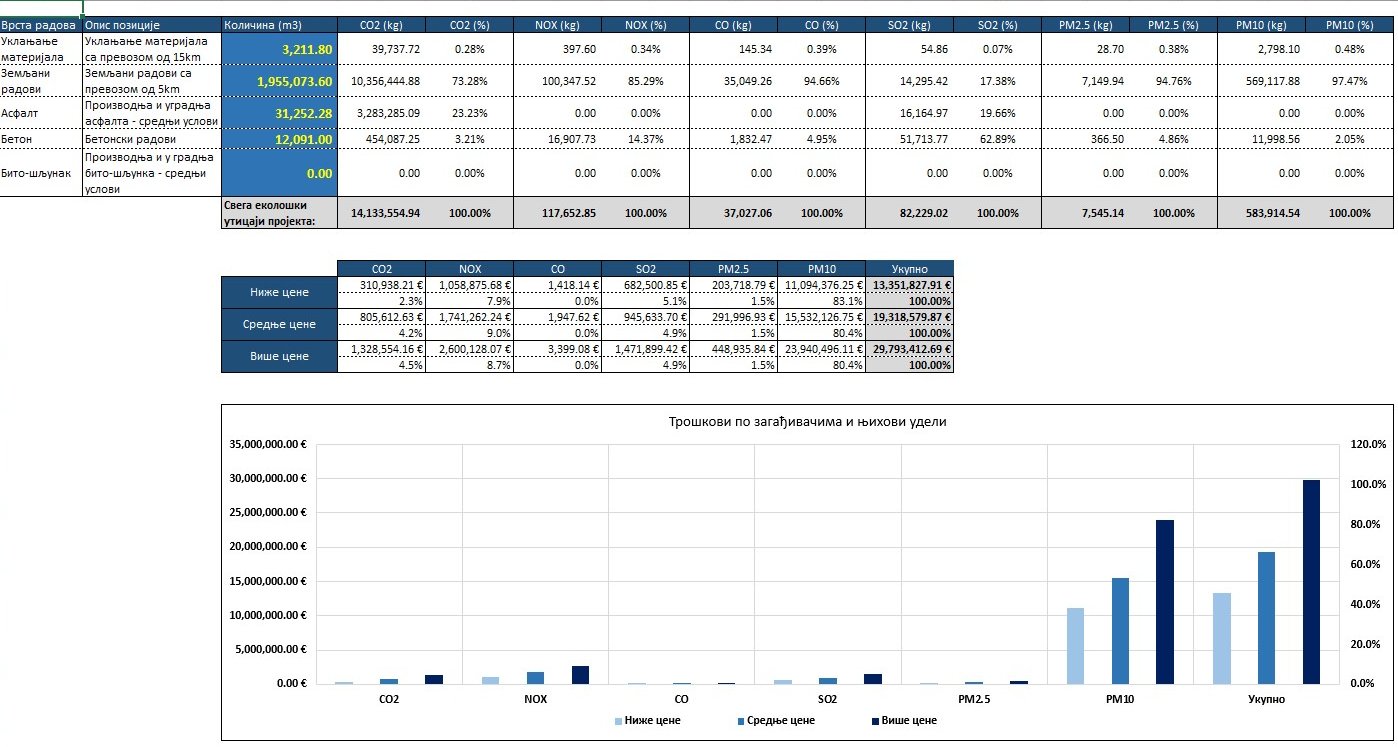As part of the comprehensive plan of the PE”Roads of Serbia” for the development of an energy management system, promotion of energy efficiency and energy saving – the following segment is also considered: how to save energy (fuel consumption) during the construction and maintenance of roads, which is inevitably followed by the reduction of negative impact on the environment.
The process of road construction often demands significant quantities of energy in the form of fossil fuels, thus creating significant emissions of gasses with the greenhouse effect.
The Department for Energy Management, as part of the Sector for Strategy, Designing and Development in the PE “Roads of Serbia”, has developed the “Study on the implementation of construction systems in the state road sector with the least impact on the environment, with reference to the road life cycle”. This study presents the global research and provides a framework and a starting point for an assessment of every future project (on the variant assessment level), for the purpose of a road cycle overview and implementation of preventive concepts of environment and protection of human health, while obeying the legally defined procedures and introducing innovative principles. PE “Roads of Serbia” continues to work on the improvement of energy management and the acknowledgement and prevention of negative impacts of roads on the environment. This study is the first step in a detailed technical assessment of sustainable roads.
The aim of this study is to improve the critical areas in road construction which could have a significant impact on the total sustainability:
- Fuel consumption (during the transport of materials from the site, between the plant and the location, and the construction process itself).
- Emission of exhaust gasses and particles.
- Traffic delays, congestions and emissions of noise created during the construction.
- Carriageway performance and total life expectancy (as the result of the construction quality).
The quantification of energy consumption in every phase of the life cycle has been made and the ecological load during the implementation of emission factors in the environment for every energy source has been assessed.
The construction of a new road is, in terms of energetics, a very demanding process. The most intense process is the production of asphalt mixtures and it has been estimated that approximately 92.4 – 92.9 % of energy is consumed here. On the other hand, the transport of materials and mixtures consumes approximately 5.7 – 6.3 % of energy, while the processes of installations consume 1.0 – 1.8 % of energy.
Some of the data obtained in the study is that, during the maintenance of asphalt surfaces using different recycling methods on the spot (cold in-place recycling as opposed to hot in-place recycling), energy is saved by 35 – 40% in comparison with the conventional techniques.
The potential energy saving as the result of route modification would be between 12% and 34%, which would introduce energy implications as a factor in the designing of new roads, with the aim of reducing the overall energy used during the construction and the usage of roads. Assessment has been made regarding the energy (fuel consumption), used for numerous paths and types of roads. The calculation for energy consumption in traffic would take into account the road geometry, characteristics and conditions of the road surface, details of vehicles, driving behaviour as well as the meteorological conditions.
Road construction practice has been significantly changed in the last few decades. The use of new technologies has brought to the improvement of the carriageway quality and the construction efficiency, with the reduction of energy consumption and impact on the environment at the same time. The new construction method, together with the adequate structural pavement design, may provide significant improvements of the overall performance and sustainability.
Sustainable roads are constructed so that they reduce the impact on the environment, and designing takes into account the road life cycles, which can be improved on this level by using new methods and innovations. The very scope of works executed during the state road construction implies the examination of measures which could further reduce the impact on the environment. The assessment of other case studies (saving energy in designing, maintenance and use of pavement (ECRPD), developed from the IERD project (ECRPD 2010)), has shown that energy can be saved in all assessed phases of the road life cycle, as follows:
- Construction: up to 47%
- Maintenance: up to 30%
- Work: up to 20%
PE “Roads of Serbia”, as a result of the assessment of elements of designing, technologies and organization of execution of works on the construction and maintenance, on the basis of data, which is a standard part of technical documentation, has a possibility to assess the potential risks of construction, i.e. further improve the understanding of energy consumption in all phases, the accompanying ecological consequences and prevent an excessive use of energy and a negative impact on the environment.
The conducted research comprises the data on how much the operation of construction machinery and the construction process have an impact on the pollution and road sustainability; the calculation of costs imposed upon the community by the pollution; and also engineering knowledge and experience regarding the handling of construction machines and the work in real conditions in Serbia. Development of a system for assessment, evaluation and impact on the people’s health is also planned in the forthcoming period.
An important result of this Study is also the Software tool, enabling quick and reliable identification of impact on the environment (carbon dioxide (CO2), nytrogen oxides (NOx), sulphur dioxide (SO2), suspended particles PM2.5 and PM10), on the basis of the road design and the bill of quantities.
Beside the efficiency, this method provides the PE “Roads of Serbia” with the opportunity to choose the best variant of the design by considering the total cost of the design, including the quantification and the valorisation of the ecological effects, i.e. the effects on the people’s health.
The collection of this data ensures the required level of quality for the works and risks for the environment and people’s health are reduced.
Based on the suggested methodology, the PE “Roads of Serbia” can simply expand their terms of reference for the development of technical documentation and obtain a systematic and indisputable assessment of the ecological consequences of a road construction, measured in both concrete emissions and calculated as “ecological expenditures”.
During the selection of the optimal variant of the road construction, it is now possible to enter the parameter “ecological expenditures”, and later the expenditures of impact on people’s health. In that way, the PE “Roads of Serbia” will be able to have an overview of the total cost of the construction and select the truly best variant of technical documentation.
An example of the assessment is given below:

The Study may be read on the following link:
https://www.putevi-srbije.rs/images/pdf/strategija/Studija-primene-sist-gradjenja-u-drz-putn-sist-sa-najmanje-utic-na-ZS-uz-osvrt-na-zivotni-ciklus-puta.pdf







